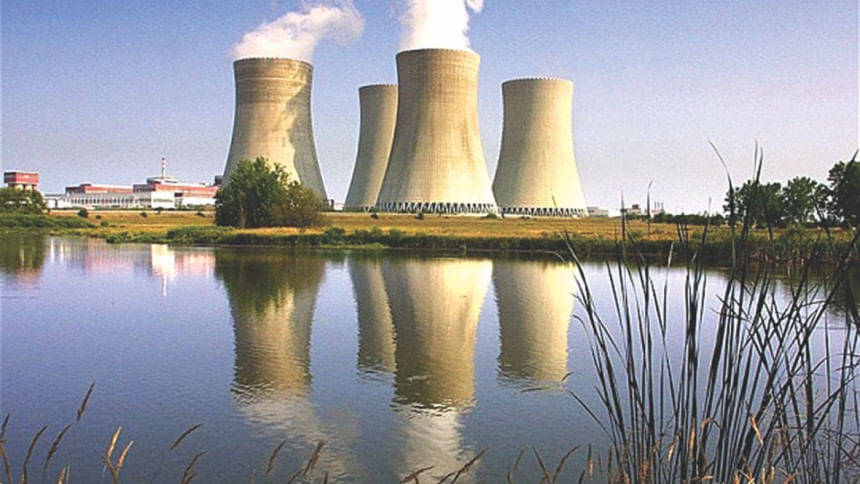FUTURE OF NUCLEAR ENERGY IN BANGLADESH

Energy, being the pre-requisite for all developments, is inevitable for emerging economies like Bangladesh to continuously run all the development activities smoothly. Most countries have been exploiting popular and common options e.g. fossil fuels and renewables to generate energy based on their socio-economic capabilities. Simultaneously, in developed countries, energy generation from nuclear reactors has garnered significant attentions as sophisticated alternative since it apparently promises to produce cleaner energy.
With the first nuclear plant established in Russia in 1954, so far more than 30 countries have been generating power from total 452 nuclear reactors. France with 58 reactors supply 72%, USA with 100 reactors supply 20%, Slovakia generates 54%, and Hungary and Belgium generate 51% of their national electrify demand. Nevertheless, on the dark side of the story, even after having adequate access to resources, competent manpower and logistics, after the tragic disaster of Japan's Fukushima Daiichi reactor in 2011, countries like Germany, Italy and Switzerland have decided to stop nuclear energy production referring nuclear power generation risks unacceptably high. Japan has 43 reactors yet after the said disaster, public opinion survey revealed the serious unwillingness of the participants in welcoming energy from nuclear reactors. Very recently, Vietnam has scrapped two prospective nuclear power plants capable of generating 4000MW on the ground of danger to the environment. Thus, even though nuclear energy is perceived by many to be the best option in energy production, it requires expert and sophisticated skills to tackle all possible technical, financial, and institutional challenges.
Bangladesh government has started the process to generate nuclear power in a couple of months in collaboration with Russian Nuclear Energy Corporation, ROSATOM. The journey which was originally started in 1961 is now in the final stage to kick-off at Ruppur in Pabna District. While the initiative taken by the government is genuinely praiseworthy, there are some serious concerns too as nuclear energy production has to undergo dangerous processes. The economic competence and dense population of the country with constant threat of natural disasters round the year may be handled positively as neighboring countries like India and Pakistan run 22 and 4 reactors respectively. Nevertheless, a successful atomic power program involving a broad framework including provisions on nuclear establishments, pool of competent human resource, facilities, investigation bodies, administrative facilities, government divisions with atomic skill, and instructive organisations with implementable disaster response programs is highly desired for Bangladesh. A very strong legal framework with the experiences of nuclear superpowers like USA, Russia, China and Japan may ensure the success of such program.
Apparently there is dearth of authoritative and reliable information available in the public domain regarding this initiative. The Nuclear Power Company of Bangladesh is established under the Nuclear Power Plant Act 2015. Even though there are some general provisions on risks and safety under the Bangladesh Nuclear Energy Control Act, 2012, so far no comprehensive law to deal with the risks, safety and possible liabilities arising out of nuclear power plant has been adopted. With these risks and safety concerns, Bangladesh should additionally consider the possibility of cyber-attacks from the terrorist groups as they have already attempted several times to cyber-attack on nuclear power plants to acquire weapons of mass destruction by hacking the cyber system of nuclear power plants.
Bangladesh's current nuclear policies have relied heavily on closed expert panels without sufficient public involvement. Although highly advanced new reactors may reduce risks based on “inherent” safe technologies, i.e. “passively safe” measures developed by the generation III reactor, for successful nuclear power production, public and stakeholder involvement before the formal operation is fundamental. Failing to do so may develop negative perception and attitude against the program.
It is high time that the government consider developing a comprehensive legal framework while the infrastructure development is going on addressing the possible challenges, i.e. risks, safety and cyber-attack regarding the nuclear plant. It may be presumed that due to the customary practice, the detailed provisions, as normally contained in the subsidiary legislations, will be adopted later on. Subsequent enactment of subsidiary law with comprehensive provisions may turn to be suicidal in relation to nuclear energy production. Instead, comprehensive legal framework should come first before the power production. Country like Malaysia has taken such approach, i.e. it has not started the nuclear plant yet, but has already adopted a comprehensive legal framework required to successfully run the program. With the successful running of more than 450 reactors around the world, the countrymen may comfortably welcome the venture, but the need to come up immediately with comprehensive legal framework should not be compromised.
The writers are Senior Lecturer in Law and PhD Candidate, University of Malaya, Malaysia respectively.

 For all latest news, follow The Daily Star's Google News channel.
For all latest news, follow The Daily Star's Google News channel. 



Comments